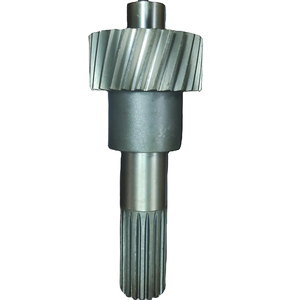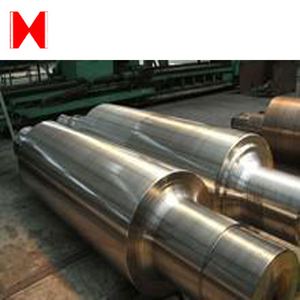(7114 products available)













































































































































































































A forging gear shaft is generally a cylindrical machine part that transmits torque and rotational motion. It might also be used to support rotating parts. A shaft is mainly built using metal. Gear shafts are primarily found in machines and vehicles. There are different types of gear shafts, represented in the list below:
Open Gear Shaft
An open gear shaft has exposed teeth to the environment. This is mainly found in older equipment. Fortunately, lubricant grease can be applied to the teeth to prevent dust and moisture from building up.
Pinion Gear Shaft
It is the smallest gear in a system. The role of the pinion is to interact with a larger gear. This interaction may lead to the transfer of rotation and torque. The pinion is normally attached to a shaft that carries the load.
Bevel Gear Shaft
A bevel gear shaft can change the direction of movement of a shaft, commonly at 90 degrees. They are also used in differential applications and transverse driving. This gear also comes in pairs and meshes with straight bevel gears.
Worm Gear Shaft
The worm gear shafts work like a screw thread. It is used to transmit high torque between non-parallel and non-intersecting shafts at right angles. The worm shaft is the actual screw that drives the gear. It is mainly used in automobile industries in areas like torque conversion and gear reduction.
Spur Gear Shaft
Spur gears have straight teeth and are parallel to the axis of rotation. Their teeth are attached or mesh together. Spur gears are mostly used in shafts that reduce low-speed rotational motion. Manufacturers usually mount them on shafts tightly to transmit high loads.
Straight Gear Shaft
The gear shafts have gear teeth parallel to the axis of the shaft. This gear shaft is mostly used in simple speed reduction applications. It is also mounted on bearings and housed in an open or closed environment.
These specifications for heavy machine shafts are crucial because they affect their performance and suitability for particular applications. Always consult with an industry expert when deciding based on these specifications.
It is essential to follow the maintenance requirements of machines used in the production of heavy-duty gear shafts. The maintenance of a heavy-duty forging machine gear shaft with a machine like this is vital because it ensures its efficiency, longevity, and safety. Proper maintenance helps prevent breakdowns, reducing downtime and production losses. It also extends the lifespan of the machine, minimizing the need for costly repairs and replacements. Moreover, it ensures that the machine operates at optimal performance, delivering high-quality forging with precision and accuracy. Additionally, regular maintenance enhances the safety of both the machine and its operators by preventing accidents and malfunctions. Ultimately, investing in maintenance helps improve the productivity of the entire manufacturing process.
Here are some key maintenance tips when dealing with forging machines:
The applications of forging gear shafts are primarily driven by industries that require heavy machines or know-how to manufacture. Gear shafts are often used in the following scenarios:
Heavy-duty machinery
Industries that trade or work with heavy-duty machinery are likely to use forged gear shafts. This includes industries in the construction, mining, oil and gas, and agricultural sectors. These industries largely use bevel shafts to support powerful machinery and ensure that the machinery works with precision and efficiency.
Industrial equipment
Industrial equipment underpinned by heavy-duty industry work likely uses a forged gear shaft. Equipment in this category includes pressure reducers, beaters, mixers, and conveyor belts. Often, industrial equipment needs to work at high torque levels and endure constant use. A gear shaft made from forged steel provides the machine precisely these qualities.
Inevitably high-stress scenarios
High-stress scenarios must regularly endure wear and tear. Applications in automotive industries, aerospace industries, and robotics are likely to use shafts made from forged steel. This is because, in these scenarios, precision, strength, and durability are non-negotiable qualities that must be present in gear shafts.
OEMs and heavy-duty machines’ replacement parts
Gear shafts made from forged steel serve as replacement parts for machines that have worn out over the years. This is true for machines in the automotive industry and machines that use heavy-duty steel. Quality replacement parts ensure that machines continue to work with precision.
When choosing a forging gear shaft, a number of aspects need to be considered:
Industry Requirements
Different industries have different needs. Think about where the shaft will be used. For example, shafts in cars may need to be lightweight for better fuel usage.
Material Quality
Opt for gear shafts made from high-quality materials. Some materials last longer, like alloy steels, which may work better in certain industries.
Size and Weight
Consider the size and weight of the forging gear shaft. It should match the machine it will be used in. Bigger and heavier shafts may be more suited to bigger machines.
Design Flexibility
Check if the supplier allows for custom designs. If there is a need for a unique model, it helps to find providers who can make one.
Supplier Services
Think of the extra services offered by the supplier, like delivery and installation support. Picking suppliers who deliver well can make for a smoother business experience.
Budget and Cost
Last but not least is budget. Do a proper market study to determine what is affordable. Spending a little more for quality can save expenses in repairs later.
Q1. What are the methods of forging gear shafts?
A1. The commonly used methods are open die forging, closed die forging, or a combination of both, depending on the specific requirements of the gear shaft.
Q2. Are there any limitations to forging gear shafts?
A2. While forging offers many advantages, it may not be suitable for producing complex shapes or small-sized shafts.
Q3. Do made-to-order forging gear shafts come with certifications?
A3. Most suppliers will offer products with ISO or other relevant certifications to ensure quality and compliance with international standards.
Q4. What is the lead time for custom forging gear shaft orders?
A2. Lead times can vary depending on the supplier, complexity of the gear shaft, and current order volume. It's best to confirm with the supplier.